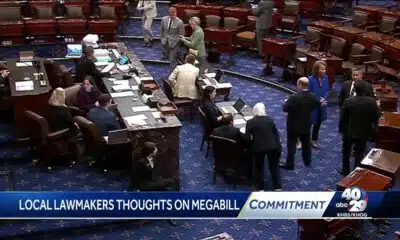News from the South - Arkansas News Feed
Senate panel advances two bills defining ‘public meeting’ in Arkansas Freedom of Information Act
Senate panel advances two bills defining ‘public meeting’ in Arkansas Freedom of Information Act
by Sonny Albarado and Mary Hennigan, Special to the Advocate, Arkansas Advocate
March 12, 2025
An Arkansas Senate committee approved two bills hours apart Tuesday seeking to define a public meeting, an issue that has plagued local elected officials and government transparency advocates for decades.
Sen. Clarke Tucker, a Little Rock Democrat and sponsor of Senate Bill 227, told the State Agencies and Governmental Affairs Committee Tuesday morning his proposal would, “after 50 years, bring clarity to the law” by setting parameters for what members of city councils, quorum courts or school boards can discuss outside of a public meeting.
The bill also would amend the Arkansas Freedom of Information Act (FOIA) to add cybersecurity breach as a reason to meet in executive session, introduce and regulate remote meeting attendance, and allow a court to nullify official actions taken as a result of violations of open meetings law.
Senate Bill 276, sponsored by Sen. Alan Clark, R-Lonsdale, defines a public meeting as any gathering of more than two members of a public body. Rep. Mary Bentley, R-Perryville, is co-sponsor of Clark’s bill, but also has her own version, House Bill 1667, which hasn’t been heard in committee yet.
Both bills brought before Tuesday’s committee would apparently accomplish the same goal — give members of local governments a clearer understanding of what they can discuss outside of a formal meeting — but opponents of Clark’s bill said it would encourage “daisy chain”-style discussion of public business by sequential groups of two officials.
The FOIA allows residents access to public records, including communication between state officials. Members of the press and curious citizens often rely on the law to get additional information about contentious subjects, or to do routine checks into financial documents. The tool was used to uncover the $19,029 lectern Gov. Sarah Huckabee Sanders bought in 2023, and provided answers to opponents of the state’s prison plan when officials remained tight-lipped.
The law also sets standards for public meetings, though vagueness in this category for the last half-century has led to frequent litigation. Tucker said his bill would establish a distinct line for what type of discussion is permissible outside of a public meeting.
Though not defined in current law, a meeting has generally been considered public when at least two members of a governing body meet.
On Tuesday, Clark asked several questions of Tucker’s bill, introduced hypothetical situations and asked about the level of involvement of school board members.
Tucker maintained that under his bill, any number of members of a governing body could meet to chat, so long as they were not “deliberating” or discussing items they would take action on in the foreseeable future.
While members of a school board cheering on the high school football team together would pose no issue, Tucker said the situation changes once the substance of the conversation becomes actionable.
“If the substance is, ‘We’re deciding public business,’ it doesn’t matter if there’s 10 people there or two, that needs to happen at a public meeting,” Tucker said. “That’s the distinction.”
Vetted, but approved
Tucker’s bill received nearly unanimous support from the committee, of which he is the only Democratic member.
A result of two years of work, Tucker said he collaborated with a bipartisan group of public meetings advocates, attorneys, members of governing bodies and state-level task forces. He said he worked to make the bill “pro-transparency” and “pro-fairness” for members of the public and those serving on committees and councils.
Committee members applauded the effort Tucker put into the 10-page proposal, but they still questioned elements of the bill and how it might hold up if challenged in court.
Sen. Dan Sullivan, R-Jonesboro, asked specifically about the use of the words “foreseeably” and “reasonably” in Tucker’s proposal, referencing concerns that a federal court recently decided to declare portions of Act 372 of 2023, which Sullivan sponsored, unconstitutional.
Tucker said his proposal did not restrict free speech, a foundational difference with the Act 372 lawsuit. He said he felt confident in the language as strict scrutiny would not be applied should the bill be challenged in court; the verbiage is typical in courts.
In response to members’ questions, Tucker admitted that he didn’t think SB 227 was perfect, but said it “goes a long way toward helping clarify what the law is.”
Jimmie Cavin, an FOIA advocate, spoke in support of Tucker’s bill Tuesday. He said he assisted with town hall meetings across the state during the last two years and encouraged members of governing bodies — like school board members — to get involved.
“It’s such a positive step in transparency, and the greatest thing is [that] it’s fair for everybody,” Cavin said. “It’s fair for Jimmie, and it’s fair for Linda Hargis, my school board member.”
Joey McCutchen, a Fort Smith attorney who has argued FOIA cases before the Arkansas Supreme Court, also testified in support of Tucker’s bill.
While McCutchen said he appreciated the definitions the bill introduces, he also said he appreciated the intent to ensure members of the public are also privy to officials’ decision-making process.
“The citizens are entitled to see the sausage making,” McCutchen said. “And if we don’t see the ‘Why?’ and we don’t see the sausage making, then we’re going to be critical of the very board members that I know you’re supporting, Sen. [Alan] Clark.”
‘Undo all the good’
Clark presented his bill after 4:30 p.m., when the committee reconvened following the day’s Senate session, and told fellow panelists his bill “better defines Sen. Tucker’s bill.”
Tucker noted that two school board or city council members could subvert the intent of the public meetings law by having one-to-one discussions until all members, or at least a majority, agreed on which way to vote on an issue.
“That’s possible,” Clark said, “but that’s not the spirit” of the bill.
Little Rock law professor and FOIA expert Robert Steinbuch testified that Clark’s bill needs language to address concerns about serial meetings.
“I don’t want to pick a number for you,” regarding how many officials should require a public meeting, he told lawmakers.
Andrew Bagley, Arkansas Press Association president and a newspaper publisher, was the only other member of the public to speak against Clark’s bill.
He began his remarks by noting that Tucker’s bill was “a very good piece of legislation that brought all the parties together at the table.”
“It was one of those moments where you almost felt like the lightning was about to flash and the thunder was about to roll because God was moving in our midst. Now we have a bill that would undo all the good we had this morning” because it would allow all the discussion to happen behind closed doors, Bagley said.
Clark asked Tucker if he would support SB 376 if it was amended to prohibit polling or serial discussions between successive pairs of officials. Tucker said he would work with Clark to craft such language but could not support the bill as written.
Clark promised he would work on such an amendment but asked that the bill be advanced Tuesday night. Tucker was the sole no in the following voice vote.
YOU MAKE OUR WORK POSSIBLE.
Arkansas Advocate is part of States Newsroom, a nonprofit news network supported by grants and a coalition of donors as a 501c(3) public charity. Arkansas Advocate maintains editorial independence. Contact Editor Sonny Albarado for questions: info@arkansasadvocate.com.
The post Senate panel advances two bills defining ‘public meeting’ in Arkansas Freedom of Information Act appeared first on arkansasadvocate.com
News from the South - Arkansas News Feed
Local Party Leaders Response to Trump's Bill
SUMMARY: Local party leaders in Arkansas express divided views on Trump’s bill advancing narrowly in the Senate. Republican Senator Bart Hester praises its progress, highlighting tax cuts and protections for Medicaid and SNAP benefits for vulnerable populations. In contrast, Arkansas Democratic Party’s Micah Wallace criticizes the bill for creating obstacles to healthcare and calls the slim margin a reflection of electoral stakes. Governor Sarah Huckabee Sanders supports the bill overall but opposes the AI regulation section, which she says undermines state powers to control AI misuse. Leaders agree the bill holds significant consequences amid ongoing national debate.
Leaders in the Natural State speak out about the progress of President Trump’s “big, beautiful bill.”
Subscribe to 40/29 on YouTube now for more: http://bit.ly/PTElbK
Get more Northwest Arkansas news: http://www.4029tv.com
Like us: http://facebook.com/4029news
Follow us: http://twitter.com/4029news
Instagram: https://www.instagram.com/4029news/
News from the South - Arkansas News Feed
Thousands celebrate pride, progress at the 2025 NWA Pride Parade
SUMMARY: Thousands gathered in Fayetteville for the 21st annual Northwest Arkansas Pride Parade, celebrating LGBTQ+ identity and progress. The lively event featured rainbow flags, costumes, signs, and dancing alongside colorful floats on Dickson Street. Attendees emphasized community support and the importance of being true to oneself. Nearby, the Tyson Main Stage hosted entertainment including local DJs, drag performers, and a concert by international pop star Betty Who, marking her Arkansas debut. The parade also commemorated ten years of marriage equality nationwide, with many honoring the milestone while advocating for continued progress and awareness of ongoing challenges faced by LGBTQ+ individuals.
Thousands celebrate pride, progress at the 2025 NWA Pride Parade
Subscribe to 40/29 on YouTube now for more: http://bit.ly/PTElbK
Get more Northwest Arkansas news: http://www.4029tv.com
Like us: http://facebook.com/4029news
Follow us: http://twitter.com/4029news
Instagram: https://www.instagram.com/4029news/
News from the South - Arkansas News Feed
Congress unlikely to enact ‘absolutely devastating’ Trump proposal to slash Pell Grants
by Shauneen Miranda, Arkansas Advocate
June 29, 2025
WASHINGTON — President Donald Trump wants to cut nearly $1,700 from the maximum Pell Grant award as part of his fiscal 2026 budget request — a move that would leave the subsidy for low-income students at its lowest level in more than a decade.
The proposal would have a devastating effect on college affordability and drive up costs for states because they’d have to fill in the missing federal dollars, education advocates and experts say.
The request — part of the president’s wish list for appropriations in fiscal 2026 — faces steep odds in Congress, where key members of both parties responded to the proposal with alarm.
“I don’t want to cut the Pell Grant,” U.S. Sen. Shelley Moore Capito, a West Virginia Republican and chair of the Senate Appropriations Subcommittee on Labor, Health and Human Services, Education, and Related Agencies, told States Newsroom.
“I’m concerned about that — I’m hoping that we’ll get that resolved,” she said.
Opposition from Capito, whose panel writes the annual bill to fund the Education Department, makes Trump’s wish unlikely to make its way into the upcoming legislation.
The Pell Grant is a government subsidy that helps low-income students pay for college and is the foundation of federal student aid in the United States.
Catherine Brown, senior policy and advocacy director at the National College Attainment Network, said the cut would be “absolutely devastating,” noting that “college is already out of reach for millions upon millions of low-income students.”
Funding gap
The Pell Grant program is seeing a projected budget shortfall of $2.7 billion heading into the next fiscal year, according to the nonpartisan Congressional Budget Office. The administration has cited the shortfall as a reason to decrease the maximum award.
The request calls for reducing the maximum Pell Grant for the 2026-2027 award year from $7,395 to $5,710. The last time the maximum award stood below this level was during the 2013-2014 award year, at $5,645.
Trump’s fiscal 2026 budget request includes $12 billion in total cuts to the Education Department as he and his administration seek to dismantle the agency and dramatically reshape the federal role in education.
Democrats: Cut would be ‘crazy’
Democrats have raised strong opposition, while even the Republican chair of the House Appropriations subcommittee that oversees Education Department funding was noncommittal about pursuing Pell Grant cuts.
“We want to make sure that (Pell Grants are) serving the people they need to,” Rep. Robert Aderholt of Alabama said when asked about any concerns he has on the proposed cut.
Aderholt said he’s hearing “a lot” from his constituents about the proposed reduction, and that it’s “certainly something we’re going to look at.”
Meanwhile, the leading Democrats on the House and Senate education spending panels were quick to blast the proposed cut.
Rep. Rosa DeLauro, ranking member of the full House Appropriations Committee and the education spending subcommittee, called the nearly $1,700 reduction “crazy.”
“People are not going to be able to do it, and that’s the tragedy of what they’re doing here is dismantling all of the constructs that are there to provide people particularly with public education and a pathway to success,” the Connecticut Democrat said.
“You take away Federal Work-Study, you lower the Pell Grant, that says to me, you want to destroy public education,” DeLauro said.
The budget request proposes slashing $980 million of Federal Work-Study funding and requiring employers to pay 75% of students’ hourly wages, with the government contributing 25%.
The program gives part-time employment to students with financial need in order to help cover the cost of college.
Sen. Tammy Baldwin, ranking member of the Senate subcommittee, said she “strongly” opposes the proposed reduction.
The Wisconsin Democrat said she also recognizes that “there’s a looming shortfall in Pell funding that we need to address.”
“I am hopeful that we’ll be able to work together to do that,” Baldwin said.
Advocates, experts weigh in
Higher education advocates and experts are also sounding the alarm on the proposed reduction, both over the harm to low-income students’ access to higher education and the impact on states and colleges.
“This would just much further exacerbate that gap and drive millions of students out of pursuing post-secondary education or set them on a different path,” Brown, with the National College Attainment Network, said.
Katharine Meyer, a governance studies fellow at the Brown Center on Education Policy at the nonpartisan Brookings Institution, described the proposed decline as “truly unprecedented.”
She added that when the Pell Grant is smaller, states have to spend more on higher education, creating a challenge for state officials potentially grappling with other cuts in federal support in the budget reconciliation package Republicans are scrambling to pass.
“States don’t necessarily have the flexibility to spend more money when they have budgets that they need to balance, and they’re facing other federal constraints, including potentially having to take on additional health care costs depending on what happens with health care negotiations in budget reconciliation,” she said.
Capito also said she thought a reduction to Pell Grants would ripple out to the state level.
At the institutional level, Meyer pointed out that if a state has a smaller bucket to allocate for higher education but wants to prioritize financial aid, it would “come at the cost of” the money appropriated to universities.
“Then institutions are not going to be able to spend as much on their operating funds,” she said. “They’re not going to be able to do capital improvement campaigns, which are often very necessary.”
Ties to reconciliation bill
House Republicans have also proposed major changes to Pell Grant eligibility as part of GOP lawmakers’ separate “big, beautiful bill.” The legislative package would slash billions of dollars in federal programs to offset the cost of other parts of Trump’s agenda, including extending the 2017 tax cuts and boosting border security funding.
GOP lawmakers are using the complex reconciliation process to move a package through Congress with simple majority votes in each chamber and avoid the Senate’s 60-vote threshold that generally requires bipartisanship.
The House narrowly passed its version of the reconciliation package in late May. That measure included a provision that would raise the minimum number of credit hours to qualify for the maximum Pell Grant award from 12 per semester to 15. The move would save $7.1 billion in federal spending over 10 years, the Congressional Budget Office estimated.
That new eligibility requirement is not included in the draft proposal for the reconciliation package that Republicans on the Senate Committee on Health, Education, Labor and Pensions released in June.
Arkansas Advocate is part of States Newsroom, a nonprofit news network supported by grants and a coalition of donors as a 501c(3) public charity. Arkansas Advocate maintains editorial independence. Contact Editor Sonny Albarado for questions: info@arkansasadvocate.com.
The post Congress unlikely to enact ‘absolutely devastating’ Trump proposal to slash Pell Grants appeared first on arkansasadvocate.com
Note: The following A.I. based commentary is not part of the original article, reproduced above, but is offered in the hopes that it will promote greater media literacy and critical thinking, by making any potential bias more visible to the reader –Staff Editor.
Political Bias Rating: Center-Left
This content leans center-left as it presents a critical view of proposed budget cuts from the Trump administration, highlighting potential negative impacts on low-income students and public education. It features voices mainly opposing the cuts, including Democrats and education advocates, emphasizing concerns about affordability and access to higher education. However, it maintains a relatively balanced tone by including some Republican opposition and contextual information, avoiding strong partisan language or overt ideological framing.
-
News from the South - Tennessee News Feed6 days ago
Thieves take thousands of dollars in equipment from Union County Soccer League
-
Mississippi Today4 days ago
Defendant in auditor’s ‘second largest’ embezzlement case in history goes free
-
News from the South - Texas News Feed6 days ago
Robert Nichols to retire from Texas Senate
-
News from the South - Louisiana News Feed5 days ago
3 lawsuits filed against CVS, Louisiana AG announces
-
News from the South - Texas News Feed7 days ago
ACLU, student group to sue Texas over expansive 'parental rights' bill
-
News from the South - Missouri News Feed5 days ago
Residents provide feedback in Kearney Street Corridor redevelopment meeting
-
News from the South - North Carolina News Feed7 days ago
Transportation energy prices skyrocket over weekend | North Carolina
-
News from the South - Alabama News Feed6 days ago
News 5 NOW at 12:30pm | June 24, 2025











































